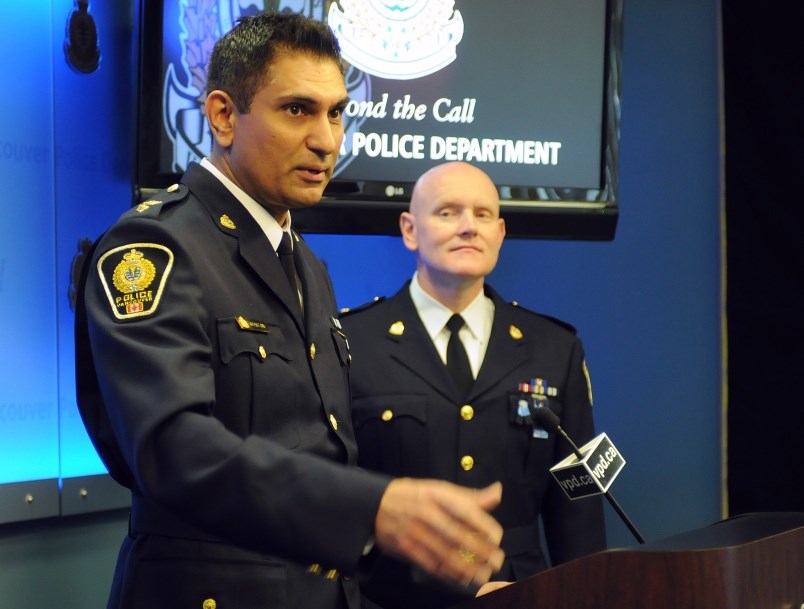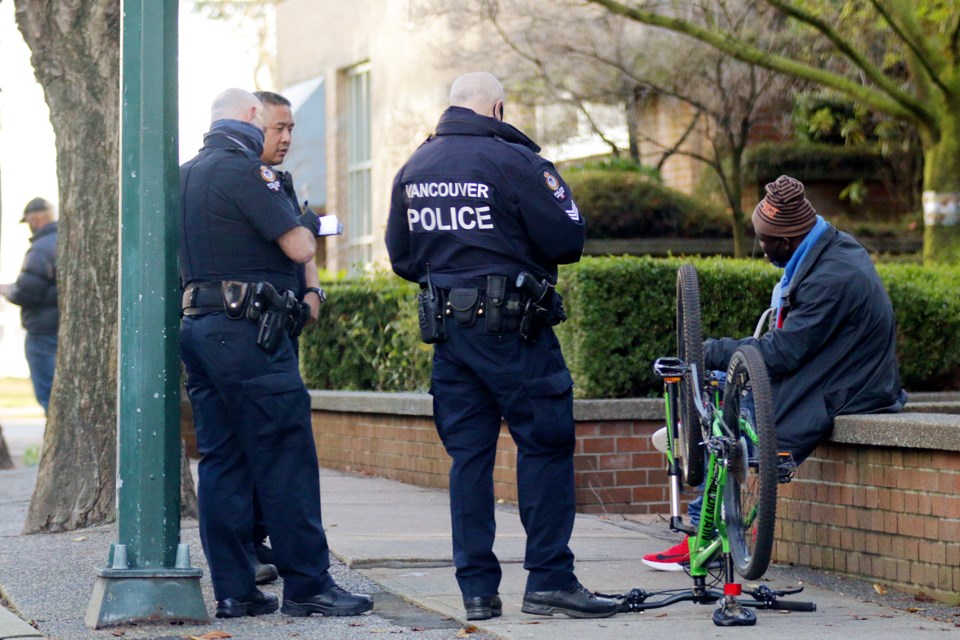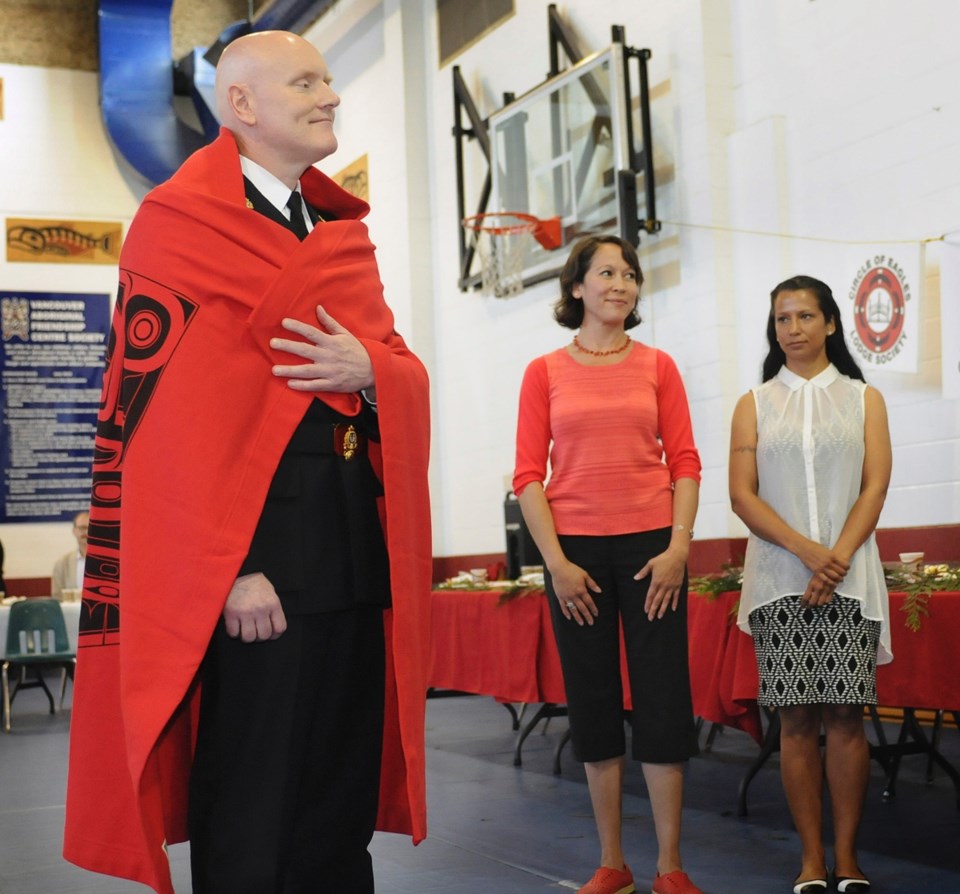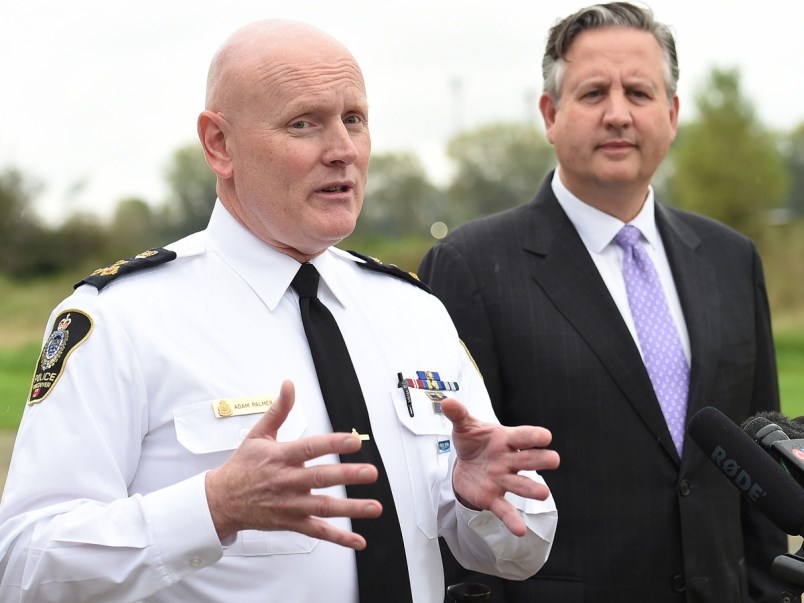Stewart has been vocal since last summer saying that systemic racism exists within the VPD, which is a position vehemently denied by Police Chief Adam Palmer and recently from Sgt. Blair Canning in a complaint to the Vancouver Police Board.
“I’ve had some very long discussions with Mayor [Naheed] Nenshi in Calgary, and if you look at what the Calgary Police Service has done, they have fully embraced this and are working on a fully anti-racism program,” Stewart told Glacier Media in an interview last week.
“Which is kind of the opposite of what is happening here. And really, that was led by the [Calgary police] board, and I do think this has to happen here, too.”
In September 2020, the Calgary Police Service released a 22-page report on its “commitment to anti-racism, equity and inclusion,” which was signed by Chief Mark Neufeld, four deputy chiefs and one acting deputy chief.
“As the executive leadership team, we are committed to addressing systemic racism in the Calgary Police Service [CPS],” said a letter on the first page of the report.
“We know that the very foundation by which policing was created was inherently racist, and yet, our vision today is to lead a police service that is committed to dismantling systems of inequity by working to become anti-racist and relentless in our pursuit of equity, diversity and inclusion.”
The report committed to a series of actions, including collecting disaggregated race-based data from police interactions with citizens and sharing it with the public. Simultaneously, the department will collect race-based data from current staff to inform strategies for the recruitment, selection and advancement of employees.
Calgary’s police force, which was the first in Canada to deploy body-worn cameras to all frontline officers, also plans to conduct an evaluation on the use of cameras and make findings available to the public.
Other commitments included:
• A review of its school resource officer program, which would examine “the perception that SROs do not make BIMPOC students feel safe and are only assigned to racialized schools.” (Vancouver school trustees scrapped the VPD program, effective this month).
• Review use-of-force policies, practice and culture.
•.Apply an anti-racism and equity lens “to all that we do.”
• Continue to address the Truth & Reconciliation Commission Calls to Action and National Inquiry on Missing & Murdered Indigenous Women and Girls Calls for Justice.
• Have a civilian executive director oversee the complaints process and modernize the professional standards section to improve transparency and accountability.
• Report public complaints related to allegations of racism and discrimination to the public through the Calgary Police Commission.
• Allocate funds to improve call response with the goal of better outcomes for citizens in crisis.
• Propose to partner with the Calgary Police Commission and City Administration on a city-wide engagement process.
Leading up to the report, the chief and his deputies said the department listened and engaged with members of the Black, Indigenous, mixed race and people of colour communities, who shared their lived experience of racism and inequity.
“It was difficult to hear that the experiences of many Calgarians are not in line with the values we espouse, and of the hurt, anger and frustration endured due to the treatment received from the CPS,” they wrote. “We humbly apologize for the harm we have caused.”
The Calgary department’s work is being guided by its own definition of systemic racism, which is:
“Systemic racism is embedded in policies, procedures and processes within an institution, based on negative beliefs, attitudes and ideologies towards racialized people that exclude, disadvantage or harm. These are reinforced by systems of power that create inequities, and no individual intent is required.”
In February, the City of Calgary announced that 15 residents were selected to join the new Calgary Police Service Anti-Racism Action Committee.
The stated goal of the committee is to “help identify systemic racism and language barriers to accessing police programs and services. They will also identify opportunities to work with community partners and organizations on actions to address structural racism.”
 Vancouver Deputy Chief Steve Rai. File photo Dan Toulgoet
Vancouver Deputy Chief Steve Rai. File photo Dan ToulgoetViewers who tuned into Thursday’s Vancouver Police Board meeting heard Deputy Chief Steve Rai announce the VPD has begun an “authentic and earnest” evaluation of the department’s policies and practices to “ensure systemic biases are not embedded in our operations.”
“We’ve initiated an equity, diversity and inclusion review of all our procedures and policies governing the VPD,” said Rai, noting the department’s planning and research section is leading the review.
The VPD has also established an internal “inclusive workplace committee” that will examine internal processes, including recruitment, transfers and promotion of officers and civilians. Rai said the department will hire an external consultant “to validate our framework and to assist in delivering and communicating any items we may look at changing.”
The department will then take any of “those items that we’ve discovered that may be contributing to bias and follow up with our entire staff — all 2,200 members sworn and civilian professionals and ensure they receive updated training and awareness around bias and decision making,” Rai said.
Stewart doubles as the chairperson of the police board but recently told CBC radio’s Stephen Quinn that he would no longer be the board’s spokesperson because he found its ambiguous position on systemic racism “indefensible.”
The mayor was absent from Thursday’s meeting because of council duties.
Documents included in Thursday’s police board agenda related to the handcuffing of Heiltsuk Nation grandfather Maxwell Johnson and his 12-year-old granddaughter in 2019, and retired B.C. Supreme Court Justice Selwyn Romilly in May, show the department is also reviewing its handcuffing policy and Indigenous cultural competency training.
 Prime Minister Justin Trudeau has said systemic racism exists in all Canadian institutions, including police departments. Photo Rob Kruyt
Prime Minister Justin Trudeau has said systemic racism exists in all Canadian institutions, including police departments. Photo Rob KruytTensions have been rising between the VPD and the mayor since last summer when Stewart said he believed systemic racism existed “in all our institutions, and that includes within the Vancouver Police Department.”
He reiterated that position June 18 in an email to supporters and included the City of Vancouver and the police board in his statement about systemic racism.
As Dan Fumano at Postmedia reported last week, the mayor’s position triggered Sgt. Blair Canning, a 23-year veteran of the VPD, to write a complaint to the police board about Stewart, saying his comments to media and on social media have had “a negative and detrimental impact on the organization, the workforce as a whole and to individual employees of the VPD.”
In the letter, which was obtained by Glacier Media, Canning made the following points:
• “He actively participates in eroding the public confidence and perception of the VPD by making generalized, often misinformed political statements, which contribute to an overall negative view of policing and police officers.”
• “The mayor is commenting on incidents contrary to our policies, and almost automatically [without evidence or due process] indicating it is connected to ‘systemic racism’ within the VPD. Over the same period of time, Vancouver police members have seen as a result, increased assaults on police officers, and also as alarming, a decrease in recruitment applications.”
• “It is clear that Mayor Stewart is not fond of the Vancouver police. Within the same examination of his media statements, he has done nothing to foster a positive environment or public perception. It is also clear that his demonstrated negative view of policing is shared by a few city councillors as well, who may also constitute our employers as the City of Vancouver.”
• “I am not perfect but I have tried to work hard and to do my best every day. To suggest that a negative incident or error involving the police and a BIPOC member of the community is automatically assumed a result of racism, is unprofessional and slanderous. To further publicly state or encourage that conversation is absolutely wrong and offensive. This is what the mayor has continued to do.”
• “I applaud Chief Constable Palmer for having the character to disagree publicly with the mayor’s comments regarding ‘systemic racism.’ I am sure it was not easy given the climate and that his supervisor [Mayor Stewart] had publicly stated the opposite.”
Canning’s complaint was not heard at Thursday’s police board meeting.
Stewart told Glacier Media last week that he wasn’t clear on who or how it will be dealt with, noting his role as chairperson doesn’t allow him to move motions or vote, unless there is a tie.
An emailed statement from the board this week said:
“As a board, we are not lawfully permitted to publicly discuss any private correspondence received by the board, that contains confidential information. As such, I am unable to provide you with a response specific to any particular matter."
The board, which is comprised of citizens appointed by the provincial and city governments, heard from Markiel Simpson Thursday, who called for Palmer’s resignation. Simpson is an anti-racism activist and recently ran unsuccessfully to become the NDP’s federal candidate for Burnaby North-Seymour.
“Simply put, the current situation between the City of Vancouver and the Vancouver Police Board and the Vancouver Police Department is untenable,” he said.
“Therefore, it is incumbent on you — appointed members of the board — to acknowledge the existence of systemic racism within the VPD and relieve Chief Adam Palmer of his duties, as his leadership has caused great trouble to our public institutions and the relationship between racialized people and the Vancouver Police Department.”
 Chief Adam Palmer at a blanketing ceremony at the Aboriginal Friendship Centre in 2015. File photo Dan Toulgoet
Chief Adam Palmer at a blanketing ceremony at the Aboriginal Friendship Centre in 2015. File photo Dan ToulgoetIn an interview with Glacier Media in June 2020, Palmer was asked whether systemic racism existed within the VPD. The interview occurred after Prime Minister Justin Trudeau said the same month that systemic racism existed in all Canadian institutions, including police departments.
This was Palmer’s response:
“If you’re trying to pin me down on the Vancouver police department specifically, what I will say is that I’m not naive to think that we don’t have some people in this department, or any police agencies, that perhaps have views that are inappropriate, or dark-hearted, or whatever you want to call it — but just a completely off-base way of thinking about race and how to treat other people. That’s possible, and we do have oversight to root those people out. I’m sure we have some people that have improper views and terrible views, but I would say that is a huge minority of our police department.”
Added Palmer: “We have incredible people here. We don’t have racists at the VPD. This is not a racist organization. We’re very community minded and we care about our community and are compassionate to our community.”
Palmer's contract with the VPD expires in May 2023.
@Howellings



